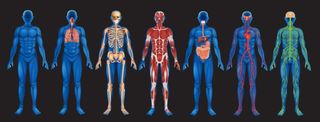What's So Special About Google's Health Study?

What if, in addition to your medical history, your doctor knew about your Internet search history, kept track of your emails and took photos of your house?
Though that's not reality quite yet, these possibilities may not be too far off, now that Google has launched an ambitious project to study the health of the human body. The new initiative, known as the Baseline Study, aims to collect an enormous wealth of genetic and molecular information from 175 people (and, ultimately, many more) to gain a better idea of what a healthy body looks like.
It's the latest project from Google X, the company's secretive research facility that developed driverless cars and Google Glass.
Picture of health
In contrast to most medical studies, which involve people who are already sick, the idea behind the new study, which The Wall Street Journal reported last week, is to look for biomarkers — measures of a particular state of health, such as a substance that helps break down fatty foods and prevents heart disease — so it can be detected sooner. [The 7 Biggest Mysteries of the Human Body]
"For health care, this could represent an enormous advantage in terms of chronic disease prevention and, ultimately, a large reduction of costs for care of patients with advanced stages of a certain disease," said Dr. Emanuela Taioli, chief of epidemiology at North Shore-LIJ Health System in Great Neck, New York, and a researcher at The Feinstein Institute for Medical Research in Manhasset, New York.
The Google project could cost much less than a more typical study aiming to collect a similar volume of information, Taioli told Live Science in an email.
Sign up for the Live Science daily newsletter now
Get the world’s most fascinating discoveries delivered straight to your inbox.
The project isn't the first attempt to monitor people's health on a large scale. But previous efforts have been hampered by the high costs and difficulty of collecting and analyzing huge sets of medical data, experts say.
In recent years, the cost of genetic sequencing has plummeted, and today's wearable devices allow for the continuous monitoring of vital signs. The Internet search giant plans to use its considerable computing prowess to mine the vast streams of data collected as part of the study.
Dr. Andrew Conrad, a molecular biologist now working for Google X, is leading the Baseline Study. An unnamed clinical testing company has already selected participants for the pilot study and collected preliminary data on bodily fluids, The Wall Street Journal reported. The researchers plan to sequence the participants' genomes, too.
The study participants will monitor themselves using a number of wearable devices, including a smart contact lens, also developed by Google X, which can track glucose levels in tears. The company's research arm is also developing other devices that could measure heart rate and other vital signs.
Following the pilot study, Google plans to conduct a larger study with thousands of participants in conjunction with Stanford University and Duke University.
It's unlikely that the study will lead to immediate treatments and cures for diseases, Conrad said, but he expects the project will contribute to medical advances in small increments.
Privacy concerns
The prospect of a company as powerful as Google having access to so much personal health information naturally raises concerns about what the company plans to do with the data. For example, if insurance companies were to get their hands on it, they could use it to deny health insurance to people who may be at risk of developing certain diseases.
Google representatives said the health information collected in the study will be anonymous, and won't be shared with insurance companies. Institutional review boards will monitor the study, and researchers at the clinics that recruit participants, who are not employed by Google, will remove any identifying information from the data before the search company will be able to access it.
Taioli said she doesn't foresee problems with the misuse of the data by insurers. In addition, participation would be voluntary, so all participants could decide whether to accept or reject the privacy conditions, she said.
"The real issue is whether the information collected and the results will be shared with the participant," Taioli said. If the researchers offer their participants information that allows the early detection of preventable diseases, there could be a significant advantage for taking part, she said.
Taioli recommended that the study include not only genetic and molecular measures, but also behavioral ones, such as people's physical activity or diet.
Follow Tanya Lewis on Twitter and Google+. Follow us @livescience, Facebook & Google+. Original article on Live Science.

